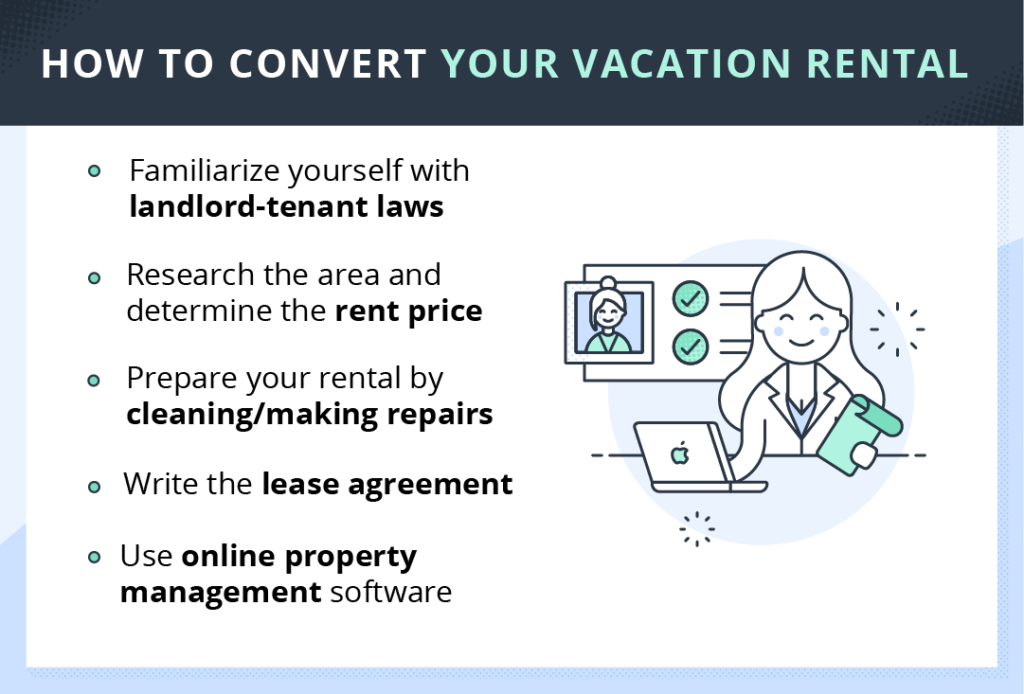11 min read
8 Best Student Housing Property Management Software Solutions on Campus
Whether dealing with property damage caused by wild college parties, high turnover rates as tenants churn through rentals, or difficulties collecting rent...

Have you considered turning your vacation rental into a long-term rental property? You’re not alone. U.S. vacation home demand has dropped 50% from pre-pandemic levels, and Dallas recently banned short-term rentals in single-family areas.
If you have a vacation rental and have had trouble filling vacancies, it might be time to convert to a long-term rental for the foreseeable future. The process can be fairly quick and you can still keep your options open with lease lengths. This guide will help you convert your property into a long-term rental.
Marketing. Applications. Leases. Payments.
Marketing. Applications. Leases. Payments.
There are pros and cons to both long-term rentals and short-term rentals – however, the state of the world today has taught us that we need to be ready to adapt quickly so we can get the best ROI as property managers. Going from a short-term to a long-term (and vice versa) should be determined based on several factors including location, financial goals, and time. Make sure you always assess your options and research the market so you know what the smartest options for your rental business will be.
Long-term rentals have many advantages when it comes to property investing and can help you fulfill your financial goals as a landlord. Here are some of the greatest benefits to long-term rentals:
While short-term rentals can be a great option for certain types of rentals and locations, there are many drawbacks that have been further unveiled by the coronavirus pandemic.

If you live close to your vacation rental, converting it into a long-term is actually fairly simple. At the same time, even if you live far from your rental, many of the steps you’ll need to take can be done virtually and, if not, you can always hire out some work to a property manager to help you.
Always do your research and make sure you know the basics of the rental laws in your area so you can always follow the law as a landlord.
You’ll want to make sure you are pricing your rental property right so you aren’t over or under – it will be different than what you priced it as a vacation rental, so make sure to analyze the rental market, which can often change.
You’ll need to prepare your rental by thoroughly cleaning and making basic repairs so your long-term renters will be excited to move-in as soon as possible. Since you’ll probably have a fully furnished vacation rental – you can decide if you want to leave things for your renters or go ahead and sell some of it and use the cash to make any additions or repairs you want to do.
Since you didn’t have a lease before, you’ll need to write or find a contract that follows local/state laws and outlines the rules of your rental property. You also have to decide how long you’d like your lease to last. If you are wanting to only go long-term for a little while, a month-to-month lease could make more sense than a 12-month lease. TurboTenant offers free online lease agreements if needed!
As you’ll want to fill your property as quickly as possible, using online tools to streamline your rental process to make it easy and secure.
A lot of the time, property investors don’t live by their vacation rentals; because of this fact, it might be intimidating to switch to a long-term rental and transition to being a long-distance landlord. Don’t let that deter you from converting your property – virtual landlording is a popular and smart option – check out how and why on our virtual landlord guide. While it’s good to have a property manager on hand to help with repairs and emergencies if you don’t live close, the whole rental process can easily be done online. Property marketing, online rental applications, screening tenants, video tours, and virtual communication with tenants are easy and trustworthy ways to successfully run your long-term rental business from afar.
11 min read
Whether dealing with property damage caused by wild college parties, high turnover rates as tenants churn through rentals, or difficulties collecting rent...
12 min read
Creative financing can offer real estate investors options beyond traditional lending from banks. If you have less-than-ideal credit or lack a sizeable...
11 min read
If you came here wondering how to write a lease agreement, look no further. Creating iron-clad rental contracts is essential for protecting the rights...
Join the 700,000+ independent landlords who rely on TurboTenant to create welcoming rental experiences.
No tricks or trials to worry about. So what’s the harm? Try it today!
TurboTenant, Inc., © 2025
Created in Sunny Colorado